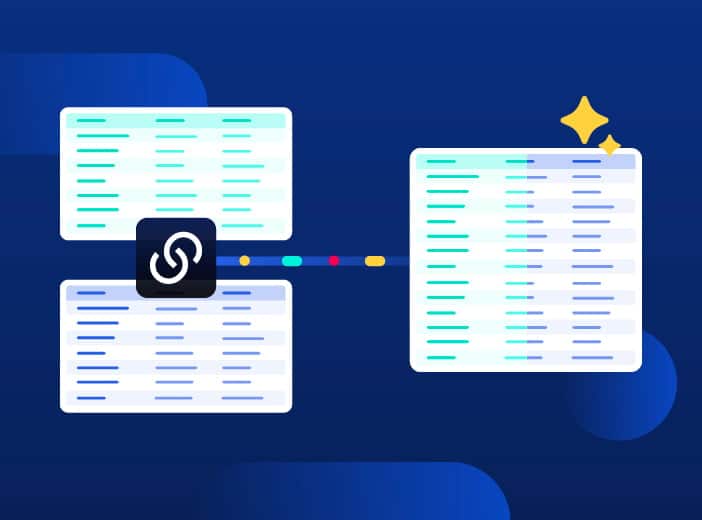Glossary
Data-driven
In a data-driven organization employees across all departments rely on insights from data to support strategic and operational decision making.
What does being data-driven mean?
In a data-driven organization all strategic and operational decisions are made based on understanding and acting on accurate and up-to-date data.
This is true across the entire organization, with all employees and all departments relying on data for decision-making. This can be referred to as data-driven decision making (DDDM). Examples include:
- Data-driven marketing: Deciding where to invest marketing resources based on the performance of previous campaigns.
- Data-driven HR: Using data analysis to identify and understand employee/recruitment pain points and then creating (and testing) solutions to solve issues.
- Data-driven sales: Targeting specific products to the right audiences based on analysis of previous sales figures.
- Data-driven production: Both deciding what products to build more of, and using production data to constantly improve the efficiency of manufacturing processes.
What are the alternatives to being data-driven?
Organizations that are not data-driven make decisions based on:
- Intuition: Essentially trying to second-guess what will happen based on gut feel
- Personal experience: Using previous experience to make decisions. However, in fast-moving markets this experience may not be directly applicable to new situations.
- Previous decisions: Continuing to do the same as before if it worked or doing the opposite if it did not. Again, this does not work in fast-moving, ever-changing markets.
What are the benefits of becoming data-driven?
Being data-driven provides organizations in all industries with a range of benefits. These include being:
- More customer-centric, reacting to changing customer needs and feedback to deliver the right products and services. For example, Amazon analyzes customer data to offer personalized recommendations to consumers, increasing engagement, loyalty and revenues.
- More agile. Able to react to changing market conditions through faster, more informed decision-making. Netflix uses data analysis to decide which programs to make to appeal to subscribers, enabling it to target budgets effectively and disrupt the entertainment industry.
- More productive. Time is not wasted by employees on poor decision-making, leading to greater efficiency and productivity.
- More innovative. Organizations go beyond current products, services and ways of working by using data to drive innovation and improvements that out-compete rivals.
- More transparent. As decisions are made based on data, rather than guesswork there is a clear audit trail of why they were made that can be shared. This is particularly important in public sector organizations who need to justify all decisions to citizens.
- More automated. Being data-driven is a pre-requisite for successfully embracing AI and machine learning, enabling companies to automate processes and make ever-more complex decisions.
Demonstrating these benefits research from Forrester Consulting found that businesses that rely on data to make decisions are 58% more likely to beat their revenue goals than non-data driven companies.
What are the traits of a data-driven organization?
Building a data-driven organization requires specific traits, behaviors, and tools to be in place:
- A data culture, led from the top. Senior management lead by example, helping create a culture based on understanding and relying on data across the organization.
- Data is accessible to all. Whatever an employee’s role and skill level, they have self-service access to the data they require to carry out their job. Data is not just the domain of data analysts. Data is democratized, and easily available in the right formats, such as through data visualizations.
- Data literacy. Everyone is confident and happy to use data and has the skills, proficiency, and training to work effectively with data.
- Data is universal and high-quality. The right data is collected and shared, and is certified and checked as accurate and high quality. Strong governance enforces quality, which increases trust.
- Technology is fit for purpose. The data infrastructure contains the right tools to collect, enrich, process and share data for all.
- A focus on continuous improvement. The entire organization embraces test and learn methodologies, using data with the aim of continuously improving performance.
What are the challenges to building a data-driven organization?
83% of CEOs surveyed by IDC want their organization to be more data driven. However, according to research from NewVantage Partners, just 26.5% of organizations report having established a data-driven organization. Why is it so hard? There are 4 main reasons:
- Culture. The primary reasons that data initiatives fail are cultural and organizational. Silos within the business won’t engage, share or use data, staff fail to see the benefits and processes continue to rely on old-style decision making.
- Lack of data proficiency. Alongside cultural issues, employees do not receive the training or skills to become literate and proficient when it comes to data. This creates barriers to usage and means they do not understand the importance of data.
- Incomplete tech stack. Organizations have invested heavily in technology, but may not have built a complete data stack that covers the entire data process. In particular, many have not focused on the experience layer, which is responsible for sharing data across the organization.
- Poorly understood or poor quality data. Organizations now have access to a huge range and volume of data, from both internal and external sources. Understanding what each dataset covers, and ensuring it is accurate and up-to-date is therefore a major challenge.
Learn more

Blog
Opendatasoft harnesses agentic AI to connect AI models to real-world data, driving greater business impact
What is agentic AI and how does it help increase data consumption? Our Q&A blog explains the current state of AI, and how Opendatasoft is innovating to drive forward its impact for customers.

Blog
Opendatasoft boosts data enrichment, even when using the largest reference sources
Enriching your data is a key step in creating relevant insights and analysis that drives value. However, when it comes to using massive reference sources such as national company databases, detailed weather data or geographic/administrative boundary datato enrich your data, technical limitations often become a challenge.

Blog
Combining data mesh and data fabric to drive greater data consumption
How can businesses organize their technology stacks to ensure that they both operate efficiently and meet the goal of increasing data consumption? We look at the importance of combining data mesh and data fabric approaches to drive success.